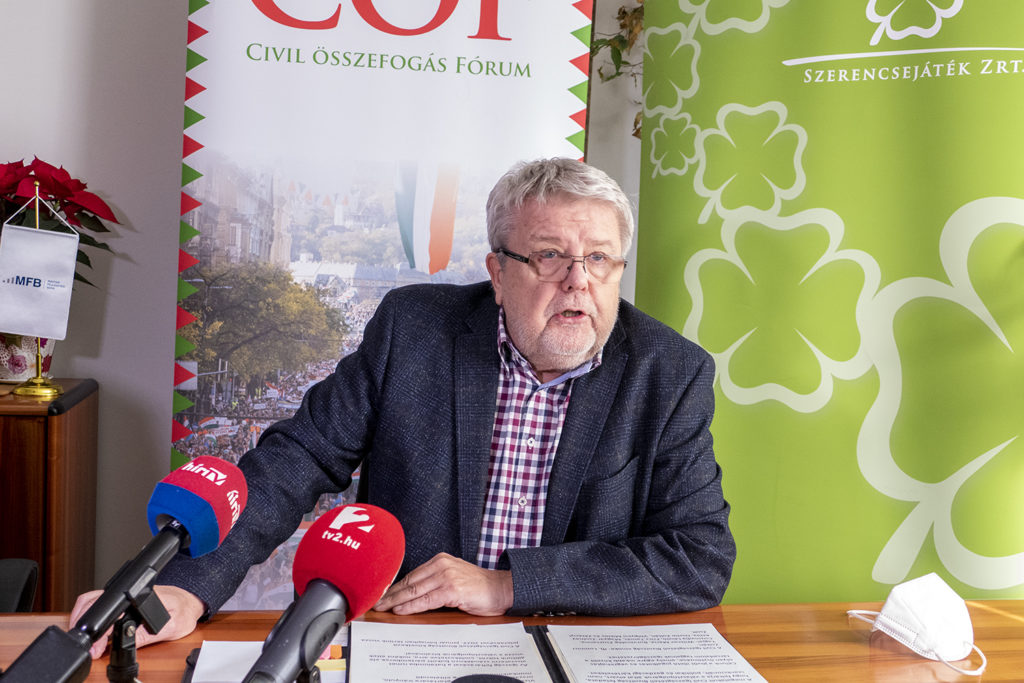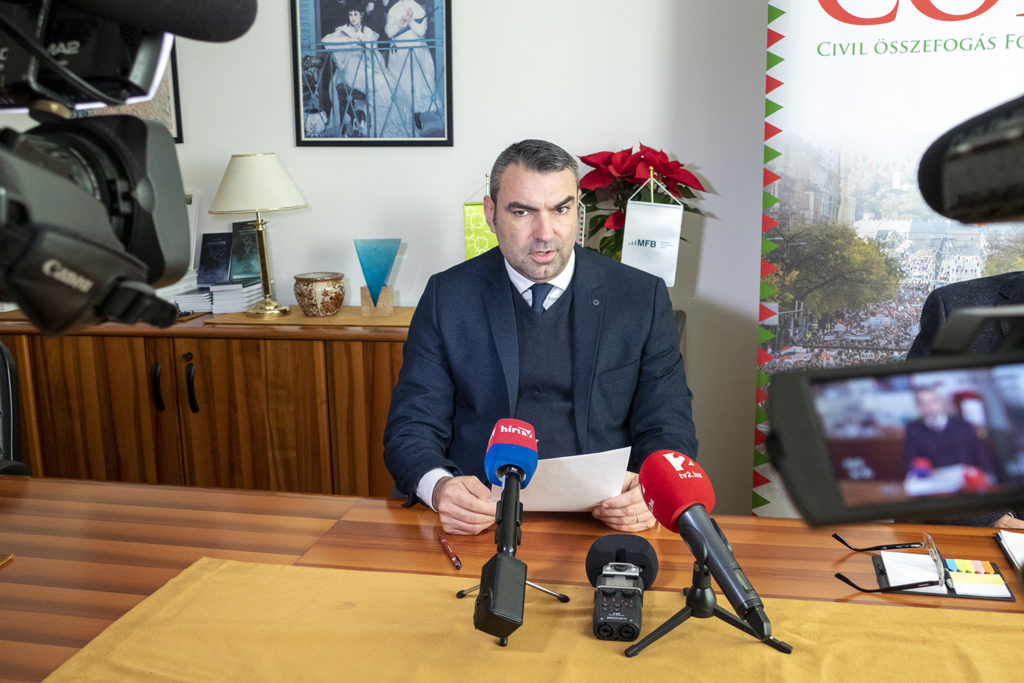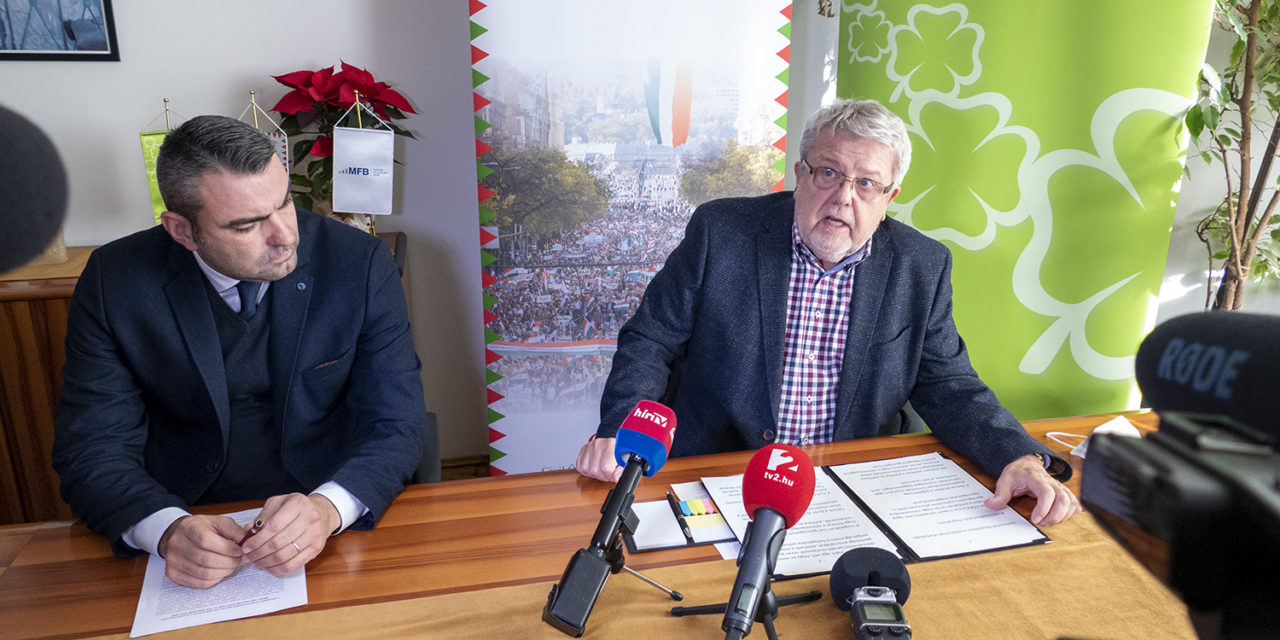CÖF-CÖKA considers it one of the sensitive points of today's Hungarian social life that the public's sense of justice sometimes differs significantly from the findings of the legal system, said László Csizmadia, president of CÖF-CÖKA, at the press conference held on December 3.
"In a democracy, the basic requirements of the rule of law ensure the separation of powers and the independence of the courts, which we must always recognize. In many cases, however, political and political accountability is not without consequences, despite the fact that the moral perception of the electorate calls for justice.
Our foundation therefore believes that we should present political and economic anomalies from the past periods that conflicted with the moral perception of the Hungarian citizenry.
The task of the established Civil Justice Committee is to reveal the unsanctioned political and economic damages expected by the voters. Our goal is to encourage future legislation and implementation in a way that is increasingly closer to the sense of justice of the members of society.

Photo: 2022plus
Chairman of the Civil Justice Committee: Zoltán Lomnici Jr.
Its members are: Mária Wittner, Zsuzsanna Borvendég, László Csizmadia, Tamás Fricz, Attila Magyar-Zsolnay, Zoltán Osztie, Miklós Völgyesi and Zsolt Zétényi.
At today's press conference, we point out the activities of the governments ruling between 2002-2010, which are presumably related to corruption, and which methodically destroyed the Hungarian economy. We are investigating their state-robbing, morally reprehensible work to maintain power. By uncovering the truth, we hold up a mirror to fallen party members who intend to return to power, reminding them how they abused the trust of the voters. We will return with the next report of the Civil Justice Commission in January 2022."

Photo: 2022plus
Zoltán Lomnici Jr.: The left wing aspiring to power has already sold off the nation's wealth once - merger of state trustees and SAO reports before 2010
following the adoption of the 2007 Property Act [1] created a difficult-to-follow, non-transparent asset management situation. The closing balance sheets of the institutions managing Hungary's state assets, which were terminated in 2008 - which would have served as the basis for the opening balance sheet of the newly established MNV Zrt. - were not prepared, and MNV Zrt. could be registered by the company court without an opening balance sheet. In such circumstances, it is difficult to talk about an actual handover, and the new institution was created in a non-transparent manner, with an indeterminable amount of state assets, and started operating on January 1, 2008.
The 2007 Property Act abolished the previous system consisting of three separate institutions - the Állami Privatizációs és Vagyonkezelő Zrt., the Treasury Directorate and the National Land Fund Management Organization - for institutions dealing with the management and management of assets belonging to the state. The national property owned by the three organizations was transferred to MNV Zrt. as the legal successor of the predecessor organizations in such a way that - during the implementation of these measures of the law - the fate of the national property became untraceable. This made it difficult to later establish the fact of certain economic crimes, such as embezzlement; in other words, the detection of whether the appointed managers, who were entrusted with the management of state assets at the time, could have caused a serious financial disadvantage to the Hungarian state by violating their legal and constitutional obligations.
The Audit Office stated in its report (2007): "the government did not discuss a conceptual proposal in advance, the economic effects were not quantified, and no impact study was prepared. The consequence was tasks that were not completed, or that were not completed by the legal deadline, non-compliance with the legislation, and the failure to hold them accountable." The SAO's report also states that, despite the provisions of the law, these mandatory tasks were not carried out, the responsible managers from the predecessor companies were released without a declaration of criminal liability, without regard to the preparation of an authentic, audited and signed balance sheet, and without an inventory. supervision (not complying with the requirements of the Accounting and Finance Act [2] .
This confusing situation could have led, for example, to the fact that the National Audit Office's August 2009 report (on MNV Zrt.'s activities in 2008) regarding the 2008 land exchange case in Sukoro was at the mercy of the National Asset Management Council (as the executive body of MNV Zrt. established its position in the relevant period. The decisions made by the CEO of MNV Zrt. (Miklós Tátrai) in his own and delegated authority were made in a non-transparent manner and with deficiencies in decision preparation - without taking internal opinions into account. The SAO had previously recommended the elimination of these deficiencies, and asked those concerned to establish responsibility for the omissions. However, the action initiatives of the Court of Auditors were not followed by the necessary substantive responses, so the legal regulation of the transformation remained inadequate. Therefore, the SAO found the legal regulation to be incomplete or contradictory at several points, and the tasks related to the transformation were not completed at all or beyond the deadline. There was no accountability for omissions and bad decisions.
Under the leadership of Miklós Tátrai, they overstepped their authority and made decisions that were largely contrary to the law, while several people, as leaders of state organizations, attempted to exchange a state-owned area in a popular tourist spot with a businessman in Sukoró for a plot of much lower value. In connection with the exchange of land, the suspicion of irregularity - and, as the most serious concern, the serious value disproportion - was first confirmed by the report of the Court of Auditors and then by the official valuation of the prosecutor's office.
In the case of the 2008 land exchange in Sukoro, which became a protracted asset management scandal, on June 8, 2017, the Court sentenced Tátrai and Zsolt Császy, the former managers of Magyar Nemzeti Vagyonkezelő Zrt. (the same - During the prime ministership of Ferenc Gyurcsány - the MNV acted on behalf of the state in this land exchange case). According to the indictment, the land exchange contract would have cost the Hungarian state almost HUF 1.3 billion. Previously, the ÁSZ also argued that the public interest was not present when the contract was concluded, and therefore the land exchange contract was not legal.
As for the further fate of the asset manager: in 2009, the remuneration of managers of publicly owned economic companies was limited, and the available income was - fixed at the legal level - maximized. Based on the report of the ÁSZ, the principle of saving was not enforced at all, and the legal requirements were not observed either, two top managers and seventeen committee members were then able to receive 9.3 million forints more per month than the amount specified in the law. At the same time, based on the audit report, they did not perform actual, high-quality work or useful activities that would entitle them to such a consideration. The ÁSZ found that the state assets actually existing on January 1, 2008 could not be reconstructed in the first half of 2009, and the economic events could not be followed in the accounting records of MNV Zrt.
During the audit, MNV Zrt. did not provide the Audit Office with the data essential for the audit, thereby seriously complicating and interfering with the subsequent investigation - also based on the contents of the State Audit Office's report. The first official balance sheet therefore contained false data in a misleading manner, but no prosecution was held. Regarding the effective contracts of the predecessor organizations, during the handover, more than 3,500 contracts were lost, and the contracts with a value not exceeding five million forints were not made public, thereby violating the fundamental right to access data of public interest. Due to the method of fee calculations and invoicing, the then Hungarian state (and the budget) lost significant revenues. Despite all these facts, political accountability - in connection with the irresponsible, wasteful management of the national wealth before 2010 - has been lacking.
After 2014, independent experts of national civil organizations, especially the Civil Solidarity Forum (CÖF), carried out significant fact-finding work regarding the irresponsible economic policy of the governments between 2002 and 2010, as well as the government's behavior and public manipulations before 2010 during the events of the state trust. The reports of the State Audit Office between 2007 and 2009 were considered an important source in their information-gathering and reconnaissance work.
Summa summarum: before 2010, the governing left sold the state ownership of 190 companies during two terms, but a significant part of the HUF 750 billion flowing into the budget seemed to have disappeared from there.
For this reason, during the economic crisis, there were no funds available for the targeted support of various social groups, as happens, for example, nowadays in the case of the most vulnerable pensioners or young people under 25 who take up work. Today, the Hungarian government protects the nation's wealth, and it enjoys strengthened constitutional protection. Article 38 (1) of the Basic Law also states that the property of the state and local governments is national property, and that the purpose of managing and protecting "national property" is to serve the public interest, meet common needs and protect natural resources, as well as taking into account the needs of future generations".
[1] CVI of 2007. law on state property
[2] Act C of 2000 on accounting
(then in effect) CXII of 1996. Act on Credit Institutions and Financial Enterprises
Photos: 2022plus













